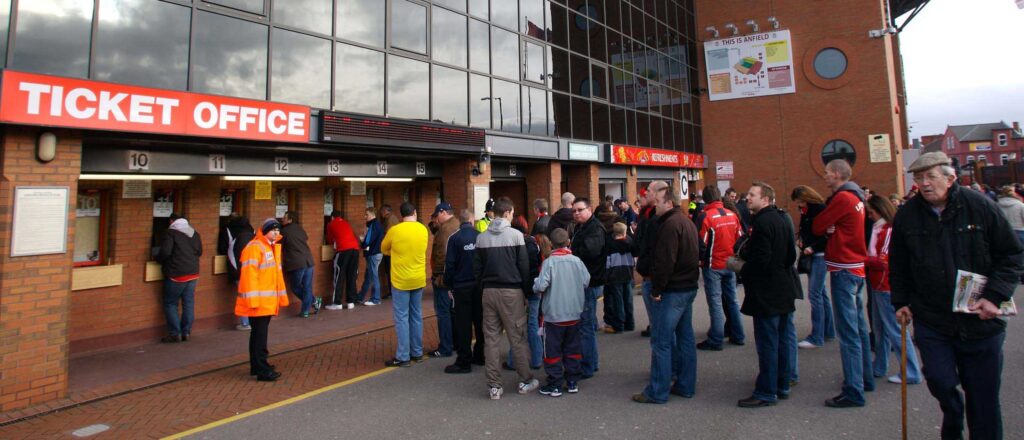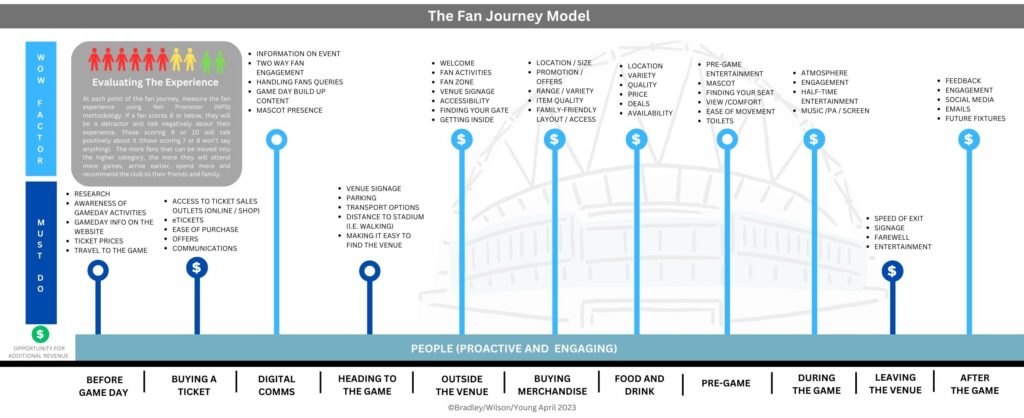© The Fan Experience Company 2023

The Fans Journey - Part 3: Buying a Ticket
So, we’ve seen the game we want to go to. We’ve checked online and there are still some seats available.
Now all we need to do is purchase our tickets and we’re on our way, right? Well…kind of.
In theory it should be that easy. After all, we live in a world where we can put a probe onto Saturn using a joystick and pay for fuel with absolutely no human interaction (although to be fair, I was doing that as far back as 1997).
The reality with buying tickets can be somewhat different and varies a lot depending on the club and a few other factors.
First things first though. Most fans – especially prospective new fans – will visit the club website if they want to purchase a ticket or two.
There are still – of course – the good old fashioned ticket offices, but as more clubs migrate towards online sales, you wonder how long for. They are becoming more of a collection point than a sales point. Turn up to buy a ticket at most grounds and there will be a long queue, possibly deliberately.
The club don’t really want too many people doing that – especially on the day of a game – and would rather you have purchased earlier so they know who’s going to turn up.
But it should be easier than that anyway.

Mark Bradley
@fanexperienceco
Mark founded the Fan Experience Company in 2005 to build attendance growth and community engagement on the basis of improving fan experiences. He recently created FC Barcelona’s Barça Innovation Hub’s first fan engagement study certificate. The Fan Experience Company has undertaken more than 3,500 fan experience assessments in many countries for clients as diverse as The Danish Superliga, The EFL, The WSL / WC, United Rugby and Premiership Rugby.

Geoff Wilson
@fanexperienceco
Geoff runs his own Sports Consultancy, working with clients such as FIFA, UEFA, AFC and FIBA across the world. He is also on the board of Tourism Northern Ireland. You can follow Geoff on twitter @geoffwnjwilson connect on Linkedin at linkedin.com/in/geoffwnjwilson

Darren Young
@fanexperienceco
Darren joined the Fan Experience Company in 2017. He has an MBA with a background in customer service excellence having worked as a consultant in that field for a number of years. As well as being responsible for all of the assessment summary reports that are produced each season, he has also worked with a number of clubs on an individual basis, including Lincoln City, Walsall, Grimsby Town, Nottingham Forest and OH Leuven on projects ranging from staff development to supporter feedback surveys.
Almost all EFL clubs allow fans to purchase tickets online these days, but further down the pyramid, it’s not always so easy. And some clubs – at all levels – still make some fans work harder to buy online, with families for instance bearing the brunt because they dare to bring a younger fan. We even saw one example of a club that asked the purchaser to prove the child was who they said they were. It took over thirty minutes to buy them a ticket. Some adoptions have been concluded more quickly than that.
Social media is another place where the ticket purchase might start although it will almost certainly be a link that takes you to the website or ticketing system. And for those that still use their phones to make calls, you can probably do that too. Clubs take note on that one; a call gives you the chance to listen, pick up on cues from the fan about who they are attending with (hint – if it’s a child then you should immediately think about how you can sell the family element of the club).
Some clubs sell via their own website while others make no secret of the fact that a third party (think Ticketmaster, although other brands are available) will handle it from here. This has obvious benefits, as the club can pass the task to someone with expertise. It also has obvious drawbacks as the club can pass the task to someone with expertise. The issue is that they have expertise in selling tickets, not selling the club. If you ask questions about what can be found at the stadium on a matchday, for instance, you will probably struggle to get an answer, and this is a good way to lose potential new fans before they even get to the game.
But let’s assume that, as a fan, we want to embrace the latest technology and buy our tickets online, and the club are also willing.
One of the ways to measure the effectiveness is ‘how many clicks?’
We did a recent study for one league and, while we won’t bore you with the detail, the answer was generally too many. Certainly more than appeared necessary.
We have to register first. Then once that’s verified, we can make the purchase although some clubs insist on the dreaded ‘linking’ the tickets to your account, which can take a few months. Or at least it can feel like that. There is a lot of duplication involved, especially when filling in contact and payment details, and it can wear you’re a fan’s patience quite thin.
Our own view is that, while it shouldn’t be that many clicks, the actual number is less important than what the click is doing. The process should move the fan (customer at this point) along smoothly, intuitively and help to build anticipation rather than frustration.
It should ideally provide a really good idea of where the tickets are (a stadium plan – with pitch clearly marked – is a good way of doing this) as well as clear pricing and, in a perfect world, an image to show you what the view is like from that seat, although I think some clubs take liberties here as I saw one that provided the same image for seats at the bottom of the stand and top of it, when there is obviously a huge difference in real life.
Also, clubs ideally need substance over style. A rugby club I recently purchased a ticket from had a ticketing system that was a bit like C3PO; very shiny and beautiful to look at, but a bit clunky and annoying when you tried to engage with it. Overhead view of stadium – check. View of stand – check. View of actual seats – check. View from seats – check. Clear pricing – this went from £20 to £52.50 when I clicked on it so no check there, and when I paid and pressed submit, the circle of death kept me waiting for more than eight minutes during which I wasn’t allowed to press the back button or, indeed, have the faintest idea what was going on until it was over.
This isn’t the ticket system you are looking for.
One area in football ticketing circles that has got a bit of stick in recent years is the women’s game. Several high-profile pundits, commentators and ex-players have highlighted that getting to a game isn’t as easy as it might be.
It is improving though. Prior to the pandemic, I tried to buy a ticket for one women’s club – that will remain nameless – and on three separate web pages the venue for the game was different. I don’t see that kind of thing these days, but it should still be much simpler.
That’s the overriding point to this section of our fan journey model. Every single club should be able to tick this touch point off because it’s perfect. Technology has evolved to a point where anyone should – subject to availability – be able to go to any club and, in seconds, find the tickets they want and then purchase one in a matter of minutes.
You know that line ‘you can’t win the lottery if you don’t buy a ticket’? Well, fans can’t come to games without buying one either.
So make sure it’s as easy as it possibly can be for them to do just that.


If you’d like help with this or other game day touch points, then make sure to listen in to The Fan Experience Experience podcast (on Spotify, Apple Podcasts and via Buzzsprout); to visit www.fanexperienceco.com or to email us via [email protected].
Mark Bradley, Geoff Wilson and Darren Young assessed the fan experience at eight matches at the 2022 World Cup in Qatar. Click here to read more about what they found there.
